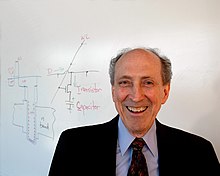Robert H. Dennard: Difference between revisions
I am his grandson. He died this morning. |
making correction to death-date and age template usage; and adding citation needed tags for his passing. |
||
| Line 4: | Line 4: | ||
|image = Robert Dennard.jpg |
|image = Robert Dennard.jpg |
||
|caption = Dr. Robert H. Dennard, IBM Fellow, beside his drawing of a DRAM cell (circuit schematic) |
|caption = Dr. Robert H. Dennard, IBM Fellow, beside his drawing of a DRAM cell (circuit schematic) |
||
|birth_date = {{birth-date |
|birth_date = {{birth-date|September 5, 1932}} |
||
|birth_place = |
|birth_place = |
||
|death_date = {{death-date and age|April 23, 2024}} |
|death_date = {{death-date and age|April 23, 2024|September 5, 1932}}{{cn}} |
||
|death_place = |
|death_place = |
||
|residence = |
|residence = |
||
| Line 29: | Line 29: | ||
|footnotes = }} |
|footnotes = }} |
||
'''Robert Heath Dennard''' (born September 5, 1932) was an American [[electrical engineer]] and [[inventor]]. |
'''Robert Heath Dennard''' (born September 5, 1932) was{{cn}} an American [[electrical engineer]] and [[inventor]]. |
||
==Biography== |
==Biography== |
||
Revision as of 10:20, 27 April 2024
Robert H. Dennard | |
|---|---|
 Dr. Robert H. Dennard, IBM Fellow, beside his drawing of a DRAM cell (circuit schematic) | |
| Born | September 5, 1932 |
| Died | April 23, 2024 (aged 91)[citation needed] |
| Known for | Inventing DRAM, Dennard scaling |
| Awards | Harvey Prize (1990) IEEE Edison Medal (2001) IEEE Medal of Honor (2009) Kyoto Prize (2013) Robert N. Noyce Award (2019) |
| Scientific career | |
| Thesis | Behavior of the ferroresonant series circuit containing a square-loop reactor (1958) |
| Doctoral advisor | Leo A. Finzi |
Robert Heath Dennard (born September 5, 1932) was[citation needed] an American electrical engineer and inventor.
Biography
Dennard was born in Terrell, Texas, U.S. He received his B.S. and M.S. degrees in Electrical Engineering from Southern Methodist University, Dallas, in 1954 and 1956, respectively. He earned a Ph.D. from Carnegie Institute of Technology in Pittsburgh, Pennsylvania, in 1958. His professional career was spent as a researcher for International Business Machines.
In 1966 he invented the one transistor memory cell consisting of a transistor and a capacitor for which a patent[1] was issued in 1968. It became the basis for today's dynamic random-access memory (DRAM). Dennard was also among the first to recognize the tremendous potential of downsizing MOSFETs. The scaling theory he and his colleagues formulated in 1974 postulated that MOSFETs continue to function as voltage-controlled switches while all key figures of merit such as layout density, operating speed, and energy efficiency improve – provided geometric dimensions, voltages, and doping concentrations are consistently scaled to maintain the same electric field. This property underlies the achievement of Moore's Law and the evolution of microelectronics over the last few decades.
In 1984, Dennard was elected a member of the National Academy of Engineering for pioneering work in FET technology, including invention of the one transistor dynamic RAM and contributions to scaling theory.
Awards and honors
- Robert N. Noyce Award (2019)[2]
- Kyoto Prize (2013)[3]
- Carnegie Mellon University Honorary Doctor of Science and Technology (2010)
- IEEE Medal of Honor (2009)
- IEEE Edison Medal (2001)[4]
- Benjamin Franklin Medal in Electrical Engineering from The Franklin Institute (2007)[5]
- U.S. National Academy of Engineering (NAE) Charles Stark Draper Prize (2009)
- elected member of the American Philosophical Society (1997)[6]
- Southern Methodist University Honorary Doctor of Science (1997)
- Harvey Prize from Technion Institute in Haifa / Israel (1990)
- Industrial Research Institute (IRI) Achievement Award (1989)[7]
- U.S. National Medal of Technology (1988)[8]
- National Academy of Engineering Member (1984)
- IEEE Cledo Brunetti Award (1982)
- appointed IBM Fellow (1979)
See also
References
- ^ US3387286A(Field-effect transistor memory) - Google Patents
- ^ Russell, John (2019-11-12). "SIA Recognizes Robert Dennard with 2019 Noyce Award". HPC Wire. Retrieved 2020-07-14.
- ^ Taft, Darryl K. (June 24, 2013). "IBM Researcher Wins Kyoto Prize for DRAM Invention". eWeek. Archived from the original on October 26, 2013. Retrieved June 24, 2013.
- ^ "Edison Medal", Awards, IEEE, 2001.
- ^ Benjamin Franklin Medal in Electrical Engineering, Franklin Institute, 2007, archived from the original on 2007-10-12.
- ^ "APS Member History". search.amphilsoc.org. Retrieved 2021-12-10.
- ^ "Dennard, Robert H", People, Computer History Museum, retrieved Feb 9, 2012.
- ^ National Medal of Technology recipients, 1988, archived from the original on 2006-08-12.
External links
- "Robert Dennard", Inventor of the Week (Archive), MIT, archived from the original on 2003-04-15.
- "Robert H Dennard", Legacies (Bio), IEEE, 10 August 2017, archived from the original on 21 November 2014, retrieved 25 July 2011.
- 1932 births
- Living people
- 20th-century American inventors
- American electrical engineers
- Carnegie Mellon University College of Engineering alumni
- People from Terrell, Texas
- National Medal of Technology recipients
- IEEE Edison Medal recipients
- Draper Prize winners
- IBM employees
- IBM Fellows
- Members of the United States National Academy of Engineering
- MOSFETs
- IEEE Medal of Honor recipients
- Members of the American Philosophical Society
- Kyoto laureates in Advanced Technology
- Benjamin Franklin Medal (Franklin Institute) laureates
- American computer specialist stubs
